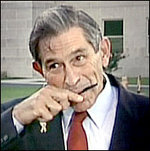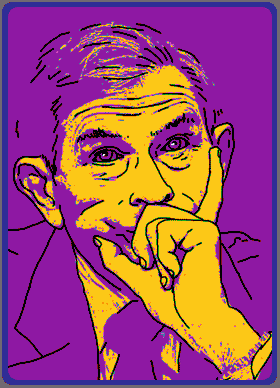La Stampa,
Italy
Wolfowitz: The Power with the Holes in His Socks
“His absent-mindedness is seen as a confirmation of a superficiality that invites serious blunders and political mistakes.”
By Maurizio Molinari 
Translated By Enrico Del Sero
January 30, 2007
Italy - La Stampa - Original
Article (Italian) 
 Paul Wolfowitz: Can the World Bank President be
Paul Wolfowitz: Can the World Bank President be
forgiven for wearing socks with holes to a mosque?
If absent-mindedness can be seen as a virtue, his
supporters say he should be. Pictured above is
Wolfowitz leaving the Selimiye Mosque in Edirne,
western Turkey, on Sunday.
----------------------------------------------------------------
FROM OUR CORRESPONDENT IN NEW YORK:  A video from Turkish TV
broadcaster NTV showing Paul Wolfowitz walking into Semiliye Mosque at Smirne
with holes in his socks encapsulates the absent-minded character of a man that
is considered one of the most cautious and influential in Washington. At World
Bank headquarters, which he has presided over since 2005 thanks to an agreement
between George W. Bush and Jacques Chirac, the news from Turkey wasn't that
surprising: forgetting to check one's socks before entering a mosque, where - everyone
knows - one must go barefoot or bring enough money for sock-shopping at the
bazaar, was to his staff absolutely in keeping with a man that dedicates most
of his personal resources reflecting on politics, making plans or imagining
historical parallels.
A video from Turkish TV
broadcaster NTV showing Paul Wolfowitz walking into Semiliye Mosque at Smirne
with holes in his socks encapsulates the absent-minded character of a man that
is considered one of the most cautious and influential in Washington. At World
Bank headquarters, which he has presided over since 2005 thanks to an agreement
between George W. Bush and Jacques Chirac, the news from Turkey wasn't that
surprising: forgetting to check one's socks before entering a mosque, where - everyone
knows - one must go barefoot or bring enough money for sock-shopping at the
bazaar, was to his staff absolutely in keeping with a man that dedicates most
of his personal resources reflecting on politics, making plans or imagining
historical parallels.
"If a former ambassador to Indonesia forgets to
check his socks the day he visits a mosque, as Wolfowitz did," one of his
aides says, asking to remain anonymous, "this is not out of a lack of
respect toward Islam but, much more trivially, to a lack of attention to
practical details." Although he spent four years as second-in-command at
the Pentagon - America's biggest and most complex U.S. federal agency -
Wolfowitz is also the former president of the Paul Nitze School of
International Studies at Johns Hopkins University, and he is still remembered
by some of his pupils for his classes, which were "extraordinary for their
improvisation."
 The old-fashioned way ...
The old-fashioned way ...
--------------------------------
When he received visitors to his Pentagon office, the
neocon intellectual, who is regarded as the mastermind behind the 2003 invasion
of Iraq, dwelled on the details of nations that have played host to him, and
rapidly dispensed details of the tactical intricacies of military operations
from Baghdad to Kabul. And yet, Wolfowitz's absent-mindedness became a cause
celeb after liberal filmmaker Michael Moore made a joke of it in his 2004
documentary Fahrenheit 9/11 Watch  . With a hidden camera, he succeeded in capturing Wolfowitz combing his
hair after bathing his comb in saliva.
. With a hidden camera, he succeeded in capturing Wolfowitz combing his
hair after bathing his comb in saliva.
[Editor's Note: The scene with Wolfowitz combing his hair was not taken by hidden camera, but rather out in the open by mainstream media prior to a formal media availability].
But when it comes to looking beyond the daily agenda,
Wolfowitz's absent-mindedness is regarded as something to tout. It's no coincidence then,
that upon being named leader of the World Bank, he chose Africa as his first
destination, and that it took just a brief unplanned visit to the tiny nation
of Burkina Faso for him to realize that - despite widespread poverty - there is
a glimmer of hope in that corner of the world thanks to the unusually peaceful
cohabitation, not only between Muslims and Christians, but amongst tribes
divided by over 30 different dialects, each having its own histories of
religious differences.
 Paul Wolfowitz: Absent-mindedly courting controversy.
Paul Wolfowitz: Absent-mindedly courting controversy.
----------------------------------------------------------
To his detractors, though, his absent-mindedness is
seen as a confirmation of a superficiality that invites serious blunders and
political mistakes. During a breakfast at Downing Street in 2005, Wolfowitz
admitted to not having read a memorandum on the forthcoming G8 Summit because
he didn't want, "to be distracted from the historical precedents" of
the arguments the memo touched upon. Tony Blair, though - and more importantly
his aides - saw this as a lack of respect. Two years earlier during a briefing
at the Pentagon, he had to apologize for forgetting the number of troops
engaged in Afghanistan. His spokesman was then forced to put right the mistake
by releasing an official statement.
Conscious of this Achilles' heel, there coexists
within Wolfowitz a healthy dose of self-irony. This relates to the color of
this hair, which is now grey, as much as it does to his well-known firmness in
defending his principled positions. It's not for
nothing that one of the phrases to which he most often resorts is, "We
should not be diverted from the objectives we pursue." He
used it while at the Pentagon in regard to his certainty that the Iraq War
wouldn't compromise the long-term battle against al-Qaeda, and he re-used it at
the World Bank to stress the need to work with Africa to achieve drastic
reforms, to enable it to resume development, limit waste and fight corruption.
Italian
Version Below
Wolfowitz, il potere con i calzini bucati
Gaffe in una moschea di Smirne. I collaboratori: nessun insulto all'Islam
CORRISPONDENTE
DA NEW YORK  Le immagini della tv
turca Ntv che riprendono Paul Wolfowitz mentre cammina nella moschea Semiliye
della città di Smirne con i calzini bucati raffigurano il carattere spesso
distratto di uno degli uomini considerati più influenti a Washington. Nel quartier
generale della Banca Mondiale, che presiede dal 2005 grazie a un'intesa fra
George W. Bush e Jacques Chirac, le notizie in arrivo dalla Turchia non hanno
sorpreso più di tanto: dimenticarsi di controllare i calzini prima di andare a
visitare una moschea, dove è noto che si cammina scalzi, o di portare con sè
denaro a sufficienza per fare gli acquisti nel bazaar, appare ad alcuni suoi
collaboratori in sintonia con un personaggio che dedica il massimo delle
risorse personali a riflettere su politiche, immaginare progetti o tracciare
paralleli storici.
Le immagini della tv
turca Ntv che riprendono Paul Wolfowitz mentre cammina nella moschea Semiliye
della città di Smirne con i calzini bucati raffigurano il carattere spesso
distratto di uno degli uomini considerati più influenti a Washington. Nel quartier
generale della Banca Mondiale, che presiede dal 2005 grazie a un'intesa fra
George W. Bush e Jacques Chirac, le notizie in arrivo dalla Turchia non hanno
sorpreso più di tanto: dimenticarsi di controllare i calzini prima di andare a
visitare una moschea, dove è noto che si cammina scalzi, o di portare con sè
denaro a sufficienza per fare gli acquisti nel bazaar, appare ad alcuni suoi
collaboratori in sintonia con un personaggio che dedica il massimo delle
risorse personali a riflettere su politiche, immaginare progetti o tracciare
paralleli storici.
«Se un ex ambasciatore in Indonesia come Wolfowitz si dimentica
di controllare i calzini nel giorno in cui va a visitare una moschea - riassume
un suo collaboratore, chiedendo l'anonimato - non è per carenza di rispetto all'Islam
ma perché, assai più banalmente, presta a volte poca attenzone ai dettgli
pratici». Sebbene abbia ricoperto per quattro anni il ruolo di vicecapo del Pentagono - il più grande e articolato ministero degli
Stati Uniti - Wolfowitz resta l'ex presidente della Scuola di studi
internazionali «Paul Nitze» alla Johns Hopkins University ricordato da alcuni
suoi alunni per lezioni «straordinarie quanto improvvisate».
L'intellettuale
neoconservatore a cui stata è attribuita la paternità del progetto di invasione dell'Iraq nel 2003 quando accoglieva i visitatori nel suo
ufficio al Pentagono si soffermava a lungo sulla cultura del Paese da cui
proveniva l'ospite, liquidando velocemente i dettagli tattici delle operazioni
militari a Baghdad o Kabul. Il regista liberal Michael
Moore ha irriso questo aspetto della personalità di Wolfowitz nel 2004 con il
documentario «Fahrenheit 9/11» riuscendo a riprenderlo di nascosto con la
telecamera mentre si aggiustava i capelli con un pettine bagnato di saliva.
Ma
proprio l'essere distratto diventa una forza del presidente della Banca Mondiale quando si tratta di guardare oltre l'agenda
quotidiana. Non a caso quando, appena nominato alla guida della Banca Mondiale,
scelse l'Africa come meta del primo viaggio gli bastò una veloce sosta nell'entroterra
del piccolo Stato del Burkina Faso per accorgersi che - nonostante la diffusa
miseria - in quell'angolo di mondo c'era uno spiraglio di speranza grazie a un'insolita,
pacifica convivenza non solo fra musulmani e cristiani ma anche fra tribù
divise da oltre venti dialetti con relative storie di secolare incomprensione.
I suoi
detrattori invece leggono l'essere distratto come la conferma di una
superficialità che può portare a commettere gaffe o gravi errori politici:
durante una colazione a Downing Street nel 2005, Wolfowitz ammise di non aver
letto un memorandum sull'incombente summit del G-8 per non voler essere
«distratto dai precedenti storici» degli argomenti trattati ma il premier Tony
Blair - e soprattutto i suoi sherpa - la considerarono una mancanza di
riguardo. Due anni prima, durante un briefing al Pentagono le scuse si
dovettero invece a un vuoto di memoria sul numero dei soldati impiegati in quel
momento in Afghanistan, e il portavoce di turno fu obbligato a rimediare poco
dopo con un comunicato scritto.
Consapevole
di avere questo tallone d'Achille, Wolfowitz ci convive con un buona dose di autoironia - che chiama in causa anche il colore dei capelli
oramai grigi - ma anche ribattendo con la ben nota fermezza nel difendere le
scelte di principio. Non per nulla una delle frasi a cui ricorre più spesso è
«non farsi distrarre dall'obiettivo che perseguiamo»: l'ha usata quando era al
Pentagono riferendosi alla certezza che l'intervento in Iraq non avrebbe compromesso
la lotta di lungo termine contro Al Qaeda ed è tornato ad adoperarla alla Banca
Mondiale per sottolineare la necessità di accompagnare l'Africa sul cammino di
drastiche riforme, capaci di rilanciare lo sviluppo limitando gli sprechi e
combattendo la corruzione.